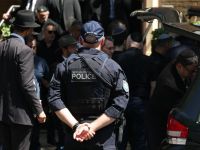Former Israeli prime minister Ariel Sharon passed away on Saturday after eight years in a coma, leaving behind a bloody and conflicted legacy in the land he called home.
Nicknamed "the Bulldozer," Sharon is remembered by Palestinians and many other Arabs for his participation in and leadership over numerous massacres in several countries and his central role in repressing the Palestinian national movement over the course of decades.
Israelis, meanwhile, remember him as a strong but controversial statesman who led the country with an iron fist through uncertain times.
Indeed, Sharon's iron fist sometimes proved too extreme even for the Israeli military. At numerous moments throughout his career he was reprimanded for his ruthlessness in dealing with Palestinian and other Arab civilians.
Despite being punished by military superiors, he consistently managed to return to leadership positions in the "most moral army in the world," as the Israeli armed forces refer to themselves.
A major supporter of the Israeli settlement movement of Palestinian lands, he presided over the unprecedented expansion of Jewish colonies in the territories occupied by Israel in 1967.
While Israelis remember him for the decision to pull 8,500 settlers out of the Gaza Strip in 2005, Palestinians remember that he was a key architect of the movement that brought 500,000 Jewish colonists to settle the West Bank and East Jerusalem.
When in 2000 he toured the Al-Aqsa compound in occupied East Jerusalem and set off a Palestinian national uprising, it was no exaggeration to say that his mere footsteps had managed to ignite a rebellion.
Indeed, there is hardly a figure in the region today who inspires as much passion and anger as Ariel Sharon.
A troubled youth
Born in 1928 to Belarussian parents on a Jewish collective settlement in the British mandate of Palestine, Sharon joined a Zionist militia in the 1940s to take part in the campaign to create a Jewish state.
Sharon participated in military campaigns led by the Haganah, which famously devised Plan Dalet. This plan was the template for the expulsion of 750,000 Palestinians from their homes in order to create a Jewish majority in what was to become Israel.
Following independence, Sharon joined the infamous Unit 101 of the Israeli armed forces, where he led covert cross-border operations against civilian and military targets in the Jordanian-occupied West Bank.
On Oct. 1953, Sharon led a squad on a raid into the village of Qibya, blowing up houses and throwing grenades at random into residential neighborhoods. The raid, which would come to be called the Qibya Massacre, killed 69 civilians, two-thirds of them women and children, and provoked international outrage.
Sharon's military legacy in the years following were also mired in controversy, as his conduct in the Suez Canal war was seen by superiors as unnecessarily aggressive.
Following a major victory against Egyptian forces in 1967, however, Sharon was appointed head of the Southern Command for the Israeli military in 1969.
Sharon the politician
By the early 1970s, however, he was in trouble with superiors again, and was subsequently relieved of duty in the armed forces.
Sharon moved into politics, and he became a major force behind the establishment of the right-wing Likud party. He was an early advocate of the movement that advocated Jewish colonization of the territories captured in 1967.
From the beginning of the settlement movement, he actively promoted efforts to take over Arab-owned lands and give them to Jews, with the intent of preventing Arabs who had fled from returning.
After success in the 1981 elections, Sharon was appointed Minister of Defense, a role that would earn him international notoriety as he presided over the bloody Israeli invasion of Lebanon.
The invasion, which came in response to PLO attacks from southern Lebanon onto Israeli territory, killed around 20,000 Lebanese and Palestinians, and was exceedingly brutal even by the standards of the ongoing Lebanese civil war.
In one of the most shocking episodes of Sharon's career, he presided over and facilitated the massacre of around 3,500 unarmed Palestinian civilians in Sabra and Shatila in southern Beirut by Israeli-supported Lebanese Phalangist militias. Israeli forces who controlled the area, surrounded the camp and lit flares during the night to help militants navigate alleyways as they slaughtered residents.
The Kahan Commission, an Israeli government body set up to ascertain whether the Israeli armed forces bore responsibility for the massacre, charged in 1982 that Sharon indirectly bore "personal responsibility" for "ignoring the danger of bloodshed and revenge" and "not taking appropriate measures to prevent bloodshed."
The brutality of the invasion of Lebanon united previously-divided Lebanese factions against Israel, and led to the creation of the Lebanese political party and militant group Hezbollah, which would go on to challenge Israeli supremacy in the region.
Israeli forces eventually withdrew from most of Lebanon but occupied southern Lebanon until 2000, when they pulled out after years of Hezbollah-led resistance.
Settlements and Intifada
Due to public pressure in the wake of the massacre, Sharon lost his position as Defense Minister but remained in the Israeli cabinet, focusing primarily on the settlement movement and domestic issues in the 1980s and 90s.
Sharon was a principle architect of the settlement movement, using his positions as Minister of Housing Construction and Minister of National Infrastructure among others to facilitate the construction of a vast apparatus of illegal settlements on occupied lands in the West Bank, the Gaza Strip, and the Golan Heights.
As Sharon told a meeting of the right-wing Tzomet party on Nov. 15, 1998: "Everybody has to move, run and grab as many hilltops as they can to enlarge the settlements because everything we take now will stay ours. ... Everything we don't grab will go to them."
In other posts, he worked to incorporate Jewish settlements into instruments of national planning, thus normalizing their status as integral parts of Israel despite their illegality under international law.
In September 2000, amid rising anger in the Palestinian territories over continuing settlement construction and the breakdown of peace talks, Ariel Sharon toured the Al-Aqsa compound in occupied East Jerusalem accompanied by 1,000 security forces.
The site is holy to both Muslims and Jews, and years of Israeli construction around the site -- including the demolition of an entire Palestinian neighborhood, the Maghrebi Quarter, in 1967 -- make it an extremely important symbol for Palestinians.
The visit led to mass protests, while violent Israeli repressions of these protests fueled into widespread public anger at Israel's failure to abide by its responsibilities according to the peace talks and end the occupation.
The days that followed marked a major escalation of the Palestinian national resistance against Israel, and unleashed waves of fury and violence against both Israeli military and civilians that became known as the Second Intifada.
Sharon subsequently emerged as Israel's Prime Minister in February 2001, and would oversee the brutal response to the Intifada that left thousands of Palestinians dead. At the same time, hundreds of Israelis died in the waves of Palestinian militant bombings that hit Israeli cities.
Sharon famously said in a statement on public radio in March 2001 in response to a US-led fact-finding commission on the beginning of the violence, "Israel may have the right to put others on trial, but certainly no one has the right to put the Jewish people and the State of Israel on trial."
'The Butcher of Beirut'
Towards the end of his life, he began to support limited pull-outs from the occupied territories. In 2005, he campaigned for and successfully implemented a withdrawal of all settlements in the Gaza Strip (and four in the West Bank), angering the settler movement and acquiring a reputation as a man of peace abroad.
But for the Palestinians, this last-minute act -- which Sharon himself argued was strategic, and not a peace offering -- did little to salvage the reputation of a man who was known popularly as the "Butcher of Beirut."
On Jan. 4, 2006, Ariel Sharon suffered a massive hemorrhagic stroke, putting him into a coma that would last more than eight years.
During that time, Israeli leaders have continued settlement expansion across the occupied West Bank and East Jerusalem.
The Gaza Strip, meanwhile, was placed under Israeli siege beginning in 2006, and Israeli military control over its borders, trade, airspace, and water mean that it is, by international standards, an occupied territory.
Nearly ten years after "the Bulldozer" disappeared from public life, his legacy of warfare and repression lives on.
In fact, he has been more successful in laying the groundwork for Israeli occupation and control than he could have ever possibly imagined.


![Former Israeli prime minister dies, eight years after he went into coma following a stroke. [AFP] Former Israeli prime minister dies, eight years after he went into coma following a stroke. [AFP]](/sites/default/files/styles/d06_standard/public/im/misc/000_Nic6280875.jpg?itok=EMg9JwjQ)




